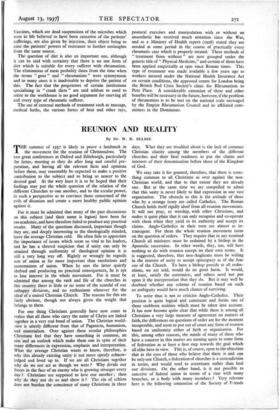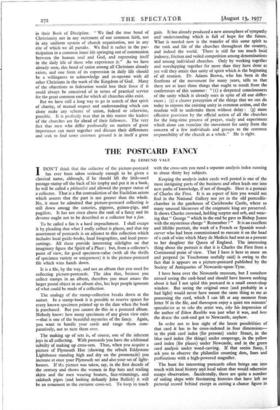REUNION AND REALITY
By Dr. W. B. SELBIE
THE summer of 1937 is likely to prove a landmark in the movement for the reunion of Christendom. The two great conferences at Oxford and Edinburgh, particularly the latter, meeting as they do after long and careful pre- paration, and having all the relevant facts and opinions before them, may reasonably be expected to make a positive contribution to the subject and to bring us nearer to the desired goal. At the very least it is to be hoped that their findings may put the whole question of the relation of the different Churches to one another, and to the secular power, in such a perspective as to convince those concerned of the evils of disunion and create a more healthy public opinion against it.
For it must be admitted that many of the past discussions on this subject (and their name is legion) have been far too academic, and have therefore failed to produce any practical results. Many of the questions discussed, important though they are, and deeply interesting to the theologically minded, leave the average Christian cold. He often fails to appreciate the importance of issues which seem so vital to his leaders, and he has a shrewd suspicion that if unity can only be attained through uniformity of theological opinion it is still a very long way off. Rightly or wrongly he regards acts of union as far more important than resolutions and protestations of union. When he sees the latter quietly shelved and producing no practical consequences, he is apt to lose interest in the whole movement. For it must be admitted that among the rank and file of the churches in this country there is little or no sense of the scandal of our unhappy divisions, and no enthusiasm whatever for the ideal of a united Christian Church. The reasons for this are fairly obvious, though not always given the weight that belongs to them.
For one thing Christians generally have now come to realise that all those who carry the name of Christ are linked together in a very real bond of union. The Christian world- view is utterly different from that of Paganism, humanism, and materialism. Over against these secular philosophies Christians feel that they have something in common, an aim and an outlook which make them one in spite of their many differences in expression, emphasis and interpretation. What the average Christian wants to know, therefore, is why this already existing unity is not more openly acknow- ledged and lived up to. If we are all Christians together why do we not act as though we were ? Why divide our forces in the face of an enemy who is growing stronger every day ? Christians are supposed to love one another ; then why do they not do so and show it ? The sin of schism does not burden the conscience of many Christians in these days. What they are troubled about is the lack of common Christian charity among the members of the different churches and their fatal readiness to put the claims and interests of their denomination before those of the Kingdom of God.
We may take it for granted, therefore, that there is some- thing common to all Christians as over against the non- Christian world, and that to that extent they are already one. But at the same time we are compelled to admit that this unity is never likely to find expression in one vast organisation. The obstacle to this is the attitude of those who by a strange irony are called Catholics. The Roman Church holds itself rigidly aloof from all reunion movements. It will not pray, or worship, with other Christians, and makes it quite plain that it can only recognise and co-operate with them when they yield to its authority and accept its claims. Anglo-Catholics in their turn are almost as in- transigent. For them the whole reunion movement turns on the question of orders. They require that in any reunited Church all ministers must be ordained by a bishop in the Apostolic succession. In other words, they, too, will have nothing to do with reunion except on their own terms. It is suggested, therefore, that non-Anglicans must be willing in the interest of unity to accept episcopacy as of the bane esse of the Church. To have a bishop preside at all ordin- ations, we are told, would do no great harm. It would, at least, satisfy the extremists, and others need not put upon it the interpretation that they do. But it may well be doubted whether any scheme of reunion based on such an ambiguity would have much chance of surviving.
To write thus is not to criticise Anglo-Catholics. Their position is quite logical and consistent and forms one of those stubborn realities which must be taken into account. It has now become quite clear that while there is among all Christians a very large measure of agreement on matters of faith, the differences on questions of order are for the moment insuperable, and seem to put out of court any form of reunion based on uniformity either of faith or organisation. For this, among other reasons, the minds of many of those who have a concern in this matter are turning again to some form of federation as at least a first step towards the goal which all alike have in view. This is, of course, open to the objection that in the eyes of those who believe that there is and can be only one Church, a federation of churches is a contradiction in terms, and would tend to accentuate rather than heal our divisions. On the other hand, is it not possible to conceive of federal union in terms of a vine with many branches, or a body with many members ? Very relevant here is the following contention of the Society of Friends in their Book of Discipline. " We find the true bond of Christianity not in any statement of our common faith, not in any uniform system of church organisation, not in any rite of which we all partake. We find it rather in the par- ticipation in a common inner life springing out of communion between the human soul and God, and expressing itself in the daily life of those who experience it." As we have already seen, this bond of union among all Christians already exists, and one form of its expression in daily life should be a willingness to acknowledge and co-operate with all other Christians in the work of the Kingdom of God. Many of the objections to federation would lose their force if it could always be conceived of in terms of practical service for the great common end for which all churches alike exist.
But we have still a long way to go in search of that spirit of charity, of mutual respect and understanding which can alone make any scheme of union, federal or otherwise, possible. It is perfectly true that in this matter the leaders of the churches are far ahead of their followers. The very fact that men who differ profoundly on matters of great importance can meet together and discuss their differences and seek to find some common ground is in itself a great gain. It has already produced a new atmosphere of sympathy and understanding which is full of hope for the future. What is needed now is the transfer of this same spirit to the rank and file of the churches throughout the country, and indeed the world. There is still far too much local jealousy, friction and veiled competition among denominations and among individual churches. Only by working together and worshipping together far more than they have done as yet will they attain that unity of spirit which is the beginning of all reunion. Dr. Adams Brown, who has been in the forefront of the movement for many years, tells us that there are at least three things that ought to result from the conferences of this summer : "(t) a deepened consciousness of the unity which is already ours in spite of all our .differ- ences ; (2) a clearer perception of the things that we can do today to express the existing unity in common action, and the resolute will to undertake them without delay : (3) more effective provision by the official action of all the churches for the long-time process of prayer, study and experiment which alone can translate the movement for unity from the concern of a few individuals and groups to the common responsibility of the church as a whole." He is right.







































 Previous page
Previous page